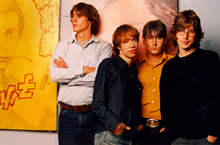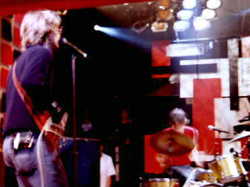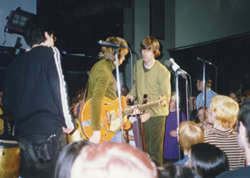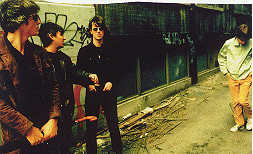|
|
February 8, 1999 CitySearch Rock, Jazz, & Pop |
 Although Celine Dion, Alanis Morrissette, and the Barenaked Ladies
may be Canada's biggest musical exports, Sloan
is probably one of the more interesting and consistent acts to come
from the Great White North. Their music mixes a variety of seemingly
retro sounds—the
FM-radio rock of Boston, the glam rock of T. Rex, and the melodic
rock of the Beatles—within
a contemporary indie style that's wised-up without being smug. Conceived
and born in Halifax, Nova Scotia, in 1991, Sloan soon began releasing
albums on its own imprint, Murderecords, and garnering critical attention.
Although Celine Dion, Alanis Morrissette, and the Barenaked Ladies
may be Canada's biggest musical exports, Sloan
is probably one of the more interesting and consistent acts to come
from the Great White North. Their music mixes a variety of seemingly
retro sounds—the
FM-radio rock of Boston, the glam rock of T. Rex, and the melodic
rock of the Beatles—within
a contemporary indie style that's wised-up without being smug. Conceived
and born in Halifax, Nova Scotia, in 1991, Sloan soon began releasing
albums on its own imprint, Murderecords, and garnering critical attention.
The band signed to DGC in the U.S. and released two albums, "Smeared" and "Twice Removed." Recorded in New York City in 1994, "Twice Removed" was critically acclaimed in the U.S. and Canada; it was named one of the "Ten Best Albums You Didn't Hear in '94" by Spin magazine. It did not sell well, and DGC felt it was "not alternative enough." The band took a break, worked on a few side projects, and wrote some new songs. After their time off, they released "One Chord to Another," which again received rave reviews from fans and press alike. Unfortunately, the U.S. label that released it—the Enclave—folded soon after the album release. Flash forward to 1999: After giving up on major labels entirely, Sloan gets back to its roots and releases its fourth full-length album, "Navy Blues," themselves on Murderecords. After the usual go-round—well-deserved critical acclaim, going gold in Canada, and extensive touring—Sloan is doing something new, namely putting together a live album. CitySearch caught up with a snowed-in Patrick Pentland (guitars, vocals), and quizzed him on all the details about the forthcoming live album, the best part of the rock-star gig, and what he likes about New York. Chatting on the phone through one hell of a cold, Patrick finally told us the darkest truth of all—Canadians don't know how to drive. CitySearch: Where are you right now? Patrick Pentland: We're at home in Toronto. We're actually kind of mixing a live record. CS: I had heard about that. You're mixing it with Brendan, your soundman? PP: That's right. This is actually one of the first records where we're not that involved in mixing actually—he's sort of taken control of that—we just kind of show up. But, it's been a really bad winter here in Toronto, unseasonably snowy. It's been hard to get around the city, because the snow removal has been really bad, and so we had to spend a few days just phoning in and saying, "How's it going?" CS: I have family in the northern U.S. They've been hit with a lot of snow.
PP: I couldn't believe it. We've just gotten an unbelievable amount of snow. It snows a fair amount here in Toronto, I suppose—I just moved here this year—but I've spent time here in the winter, and usually the snow goes away after awhile. It's just been brutal—accidents everywhere—'cause people can't drive here. They drive too fast, they're too impatient. CS: Back to the live album. Can you tell me any details?
PP: It's a lot of songs. It's supposed to be 28—it probably will be 28—but it may be 26, I'm not sure. With a live record ... you can go in and overdub mistakes and double-track vocals if you want. It would usually be our style to just record the drums and the audience, and then go in and do everything else in the studio, because we're control freaks. But for this record, we decided to kind of let go of all off that—there are some songs where the singing isn't that in tune and there are mistakes—but we just kind of left it. So, it will hopefully capture the excitement of one of our shows, as opposed to sterilizing it a bit too much. You listen to a lot of live records that are made these days—they're just so obviously not recorded live—so much treatment is done to everything. It's a humbling experience, in a way: You're listening to yourself, and it's like, "Oh my God, I can't believe I sound like that." In the studio you tend to get to do the vocals over and over again, you double-track your voice so that it sounds a bit thicker, more syrupy. Then you get this and it's like, "Do I really do that every time, do I sound like that when I talk?" That's why we haven't been that involved—I mean we have been quite involved—but we haven't been all over it, because I think we'd go in and start to redo parts, and that's not the purpose of this live record. It's not really like we're expecting it to be any sort of hit, it's for fans who've seen us, or fans who haven't been able to hear us live. CS: Will the album feature mostly selections from "Navy Blues," or older songs as well?
CS: Is touring the best part of your job, or the worst part?
PP: Well, this tour looks like it's going to be kinda fun. In the past it's been sort of ... well, middle America tends to be boring; it's all the same, and we don't do very well there. I mean it's fun, because it tends to be a bit of a challenge because they don't really know who you are. But if you're headlining a show and no one shows up ... by that point you've usually been on the road for three weeks, missing home; it's like, "What am I doing here? I don't need to do this." But for this tour, we're going to hit some major cities that we haven't been to before, like Nashville. CS: Do you have any time off in New York?
PP: Yeah, actually we do. We have the day before off, but we're mastering this live album.CS: Do you like New York?
CS: You certainly have a dedicated fan base here; it's almost a network. How do you feel about that?
PP: Well, that's sort of what we've worked at, the fan base, as opposed to working at getting the "hit single." To us it's not that important. What's more important to us, what we feel is success—every time we come down we play to more people, or we play in a town that we haven't been to before, and lots of people come. We find that you always get that Canadian portion of your audience; with every city in America there is a bunch of excited Canadians—"Yeah, I saw your first show in Calgary." What's also nice is if you play, and it's just people from that city, who don't even know you're that big in Canada, and just found your record. New York is a music industry center, so people that work at labels or MTV who've become fans over the years will come to our shows. I feel that New York is a big city and there are a lot of gigs, so people coming to see you play is nice. They don't have to go to that show; there is always something else to do in New York.
Send feedback here.
|

 PP:
I think it will be a healthy mix of all the records, including
some songs that we rarely play live, and aren't actually performed
that well—but we decided to throw them on anyway. There is
something from all of our releases—quite a few from "Navy Blues."
I do have the record here, but I didn't really count them all out.
We used the same set list everywhere we went. We used to do a different
set list every night, like the five or six songs in the middle were
the same, but we'd change the beginning and the end. But ... we
kinda stumbled on this set list we thought worked really well, and
nobody ever suggested we make another set list. So, we just sorta
put the whole set in order on the album. But, it isn't from one
show; it's taken from a couple of different shows.
PP:
I think it will be a healthy mix of all the records, including
some songs that we rarely play live, and aren't actually performed
that well—but we decided to throw them on anyway. There is
something from all of our releases—quite a few from "Navy Blues."
I do have the record here, but I didn't really count them all out.
We used the same set list everywhere we went. We used to do a different
set list every night, like the five or six songs in the middle were
the same, but we'd change the beginning and the end. But ... we
kinda stumbled on this set list we thought worked really well, and
nobody ever suggested we make another set list. So, we just sorta
put the whole set in order on the album. But, it isn't from one
show; it's taken from a couple of different shows.  PP: We do; we like New York a lot. We recorded our second
record there, so we lived there for awhile. On tour for our last
record, "One Chord to Another," we played a ridiculous amount of
shows there. It's a great city; it's so huge ... I always used to
say it's like a country, but actually there is an overall feel that
I find in New York—you always know you're in New York. We have
friends in New York from Halifax, from Canada, or just people we've
met in the music industry or whatever. I find people are always
really friendly there—not the mean, rough way they are portrayed
on TV. Plus, there is so much to do. We live in Toronto now, which
is a smaller version of New York, but there's not much to do these
days with all the snow and whatnot.
PP: We do; we like New York a lot. We recorded our second
record there, so we lived there for awhile. On tour for our last
record, "One Chord to Another," we played a ridiculous amount of
shows there. It's a great city; it's so huge ... I always used to
say it's like a country, but actually there is an overall feel that
I find in New York—you always know you're in New York. We have
friends in New York from Halifax, from Canada, or just people we've
met in the music industry or whatever. I find people are always
really friendly there—not the mean, rough way they are portrayed
on TV. Plus, there is so much to do. We live in Toronto now, which
is a smaller version of New York, but there's not much to do these
days with all the snow and whatnot.